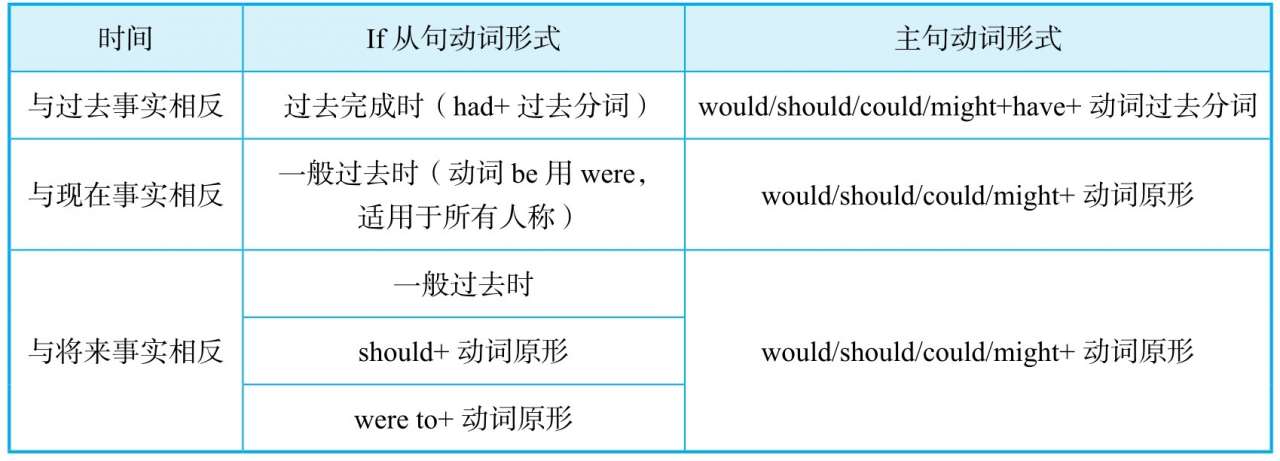条件状语从句,由引导词if或unless引导的状语从句叫作条件状语从句。条件是指某一件事情实现之后(状语从句中的动作),其他事情(主句中的动作)才能发生,通常译作“假如”。在谈论可能产生的情况及其后果时可用条件状语从句。条件状语从句可以分为真实条件句和虚拟条件句。

通常由以下连词引导:if(如果), unless(除非), in case(如果、以防), provided/providing that(假若), suppose/supposing that(假设), so/as long as(只要),only if(that)(只有), on condition that(如果)等。
1.真实条件句表示条件如能实现,主句所表示的另一件事就会发生。在这类条件句中,从句动词通常用一般现在时表示将来时间,或用现在完成时代替将来完成时。
(1)if引导。
《剑桥雅思真题7》Test 2 Passage 3
This clearly illustrates the need for supplementary measures if one wants to assist the rural poor.
这清楚地表明,如果要援助农村穷人,就需要采取补充措施。
《剑桥雅思真题8》Test 1 Passage 1
If telepathy is real, however, the hit-rate would be higher.
然而,如果心灵感应是真实存在的,命中率会更高。
《剑桥雅思真题9》Test 3 Passage 2
If tide, wind and wave power are all developed, Britain would be able to close gas, coal and nuclear power plants and export renewable power to other parts of Europe.
如果潮汐、风能和波浪能都得到开发,英国将能够关闭天然气、煤炭和核电站,并向欧洲其他地区出口可再生能源。
(2)unless引导。
《剑桥雅思真题8》Test A Section 2
Holiday cannot be carried over to the next year, unless your contract of employment allows this to happen.
假期不能拖到下一年,除非你的雇佣合同允许这种情况发生。
《剑桥雅思真题9》Test 4 Passage 2
On the other hand, they found that children of 15 to 18 months are generally not able to recognize themselves unless other cues such as movement are present.
另一方面,他们发现15到18个月大的孩子通常不能识别自己,除非有其他的线索,比如运动。
《剑桥雅思真题11》Test 1 Passage 1
Generating enough light could be prohibitively expensive, unless cheap, renewable energy is available.
除非有廉价的可再生能源,否则产生足够多的光的成本可能高得令人望而却步。
(3)as/so long as引导。
《剑桥雅思真题4》Test 2 Section 3
As long as you design the questionnaire properly in the first place, the data will be fine.
只要你一开始就设计好问卷,数据就没问题。
《剑桥雅思真题8》Test 4 Passage 1
No one minds mistakes or ignorance as long as you are prepared to learn from them.
没有人会在意错误或无知,只要你准备好从中学习。
《剑桥雅思真题12》Test 5 Section 1
Visitors are welcome to explore the farm on their own, as long as they take care to close gates and so on.
欢迎游客自行探索农场,只要他们小心关闭大门等等。
《剑桥雅思真题13》Test 4 Section 1
So long as you're well prepared there's nothing to worry about.
只要你做好准备,就没有什么可担心的。
(4)provided that引导。
《剑桥雅思真题2》Test 4 Section 2
There's no need to be nervous of the rainforest provided that you treat it with respect and common sense.
只要你以尊重和常识对待雨林,就没有必要对它感到紧张。
(5)suppose/supposing引导。
Supposing we can't finish the work on time, what will she say?
假如我们不能按时完成工作,她会说什么呢?
(6)in case引导。
《剑桥雅思真题9》Test 1 Passage 2
It is also important to keep an open mind in case any really convincing evidence emerges in the future.
同样重要的是保持开放的心态,以防将来出现任何真正有说服力的证据。
《剑桥雅思真题13》Test 2 Section 1
They also provide insurance in case you have an accident.
他们也提供保险以防你发生意外。
《剑桥雅思真题4》Test 3 Section 1
The deposit is as insurance, in case you break something.
押金是一种保险,以防你摔坏了什么东西。
(7)on condition that引导。
On condition that the house catches fire, you must protect yourself well at least.
在房子着火的条件下,你至少必须好好保护自己。
2.非真实条件句表示的是假设或实际可能性不大的甚至完全不可能发生的情况,故采用虚拟语气。
非真实条件句表示与现在、过去或者将来的事实相反的假设时,从句和主句的动词形式如下:

《剑桥雅思真题7》Test 4 Passage 2
Indeed, if Alaska was an independent nation, it would be the largest producer of wild salmon in the world.(表示对现在的虚拟)
事实上,如果阿拉斯加是一个独立的国家,它将成为世界上最大的野生鲑鱼产地。
《剑桥雅思真题8》Test 1 Passage 1
If the glass were kept hot enough, it would flow over the molten tin until the top surface was also flat, horizontal and perfectly parallel to the bottom surface.(表示对现在的虚拟)
如果玻璃保持足够的温度,它就会流过熔融的锡层,直到顶部表面也变得平坦、水平,与底部表面完全平行。
《剑桥雅思真题8》Test 2 Passage 1
If we could discharge clouds, we might affect the weather.(表示对将来的虚拟)
如果我们能驱散云层,我们可能会影响天气。
《剑桥雅思真题9》Test 4 Passage 3
If they did not provide the interpretation, visitors would do it for themselves, based on their own ideas, misconceptions and prejudices.(表示对现在的虚拟)
如果他们不提供解释,游客就会根据自己的想法、误解和偏见为自己做解释。
《剑桥雅思真题10》Test 2 Passage 3
However, if Mona Lisa was a famous novel, few people would bother to go to a museum to read the writer's actual manuscript rather than a printed reproduction.(表示对将来的虚拟)
然而,如果《蒙娜丽莎》是一部著名的小说,很少有人愿意去博物馆去读作者的原稿,而不是印刷的复制品。
《剑桥雅思真题11》Test 1 Passage 3
If we were to end geo-engineering on a given day, then the planet would return to its pre-engineered condition very rapidly.(表示对将来的虚拟)
如果我们在某一天结束地球工程,那么地球将很快恢复到它预先设计的状态。